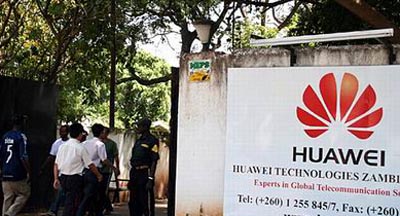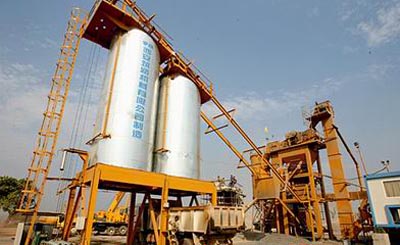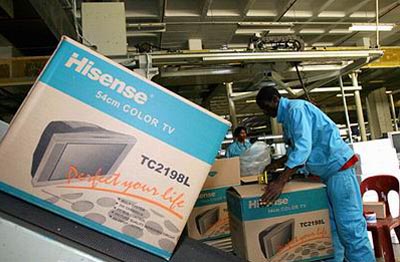| Tools: Save | Print | E-mail | Most Read |
| Beijing Summit Invigorates Private Sector Sino-African Trade |
| Adjust font size: |
China's private enterprises play an important role in the rapid development of Sino-African trade. A series of favorable measures announced at the Beijing Summit last weekend will maximize their efforts and inject new vigor into China-Africa cooperation. At the High-level Dialogue and Second Conference of Chinese and African Entrepreneurs last Saturday in Beijing, Premier Wen Jiabao proposed raising Sino-African trade volume to US$100 billion by 2010. According to Zhao Jinping, vice director of Foreign Economic Relations Department with the Development Research Center of the State Council, the various favorable measures announced during the Forum on China-Africa Cooperation (FOCAC) from November 3 to 5 will bring unprecedented opportunities to Chinese enterprises, particularly those in the private sector that are planning to enter overseas markets. A major topic of discussion at the conference was the new policies and measures aimed at enhancing Sino-African trade and investment. Some of these include the US$3 billion in preferential loans and US$2 billion in export credits that China will provide over the next three years, and the establishment of a special US$5 billion fund to encourage Chinese investment in Africa. Moreover, Chinese enterprises will also receive support and incentives to encourage them to establish economic cooperation and trade zones in some African countries. Analysts observe that these favorable measures represent a new investment channel for the US$800 billion yuan (US$101.7 billion) available domestic private capital. Further, overseas economic cooperation and trade zones will improve the local investment environment and reduce risks. Several far-sighted Chinese entrepreneurs have already started the ball rolling on moving into Africa. According to Suo Zhanrong, board chairman of the Huifeng Group in Inner Mongolia, his company plans to increase the export of raw and processed materials of traditional Chinese medicine to Africa, expanding the current business generic healthcare products portfolio to include products for cardiovascular disease and HIV prevention. The Guoji Group, based in Henan Province, recently established an economic cooperation and trade zone in Sierra Leone, which has attracted the participation of nearly 20 domestic small and medium-sized enterprises (SMEs). These companies deal in a range of products including construction materials, daily necessities and batteries. Wang Jianping, board chairman of Hazan Shoes Company, said that his company would increase its investment in Nigeria from US$2 million to US$6 million. Since it set up its shoe manufacturing plant there three years ago, Hazan has trained more than a hundred local employees in technology application, management and sales. Private Chinese enterprises are becoming an increasingly important force in African industry and commerce. Huawei Technologies, the largest CDMA provider in Sub-Saharan Africa, reported sales of more than US$1 billion. It also pays US$40 million a year in taxes in Africa.
Jiangsu-based Chunlan Group exports about 100,000 air-conditioners, washing machines and electric bicycles to the African market annually, while Holley Share Holding Group from Zhejiang Province supplies the medication Arteannuin to some 300 million African malaria patients yearly. According to statistics from the Export and Import Bank of China, other than about 100 state-owned enterprises, the majority of the more than 800 Chinese enterprises with investments in Africa are SMEs. At the first all-member meeting of the China-Africa Business Council (CABC) last month, Vice Minister of Commerce Wei Jianguo said: "The Ministry of Commerce is now working with the National Development and Reform Commission, the Ministry of Finance, the China Development Bank, the Export and Import Bank of China and insurance companies to design supportive policies and measures to facilitate bilateral cooperation." A World Bank report shows that the African economy has witnessed an average 4.3 percent growth in annual GDP over five consecutive years. This is the best investment environment Africa has had since the 1970s. According to official Chinese statistics, bilateral trade between China and Africa totaled US$40 billion in 2005. China invested US$6.3 billion in Africa that year. Further, China has signed investment protection agreements with 28 African countries and double taxation agreements with eight African countries. Contracted projects with African countries concerning construction, petroleum and chemicals, electricity, transportation and telecommunications. This is only the beginning, Wang Licheng, vice president of the CABC, said. To maintain an orderly competitive market and achieve win-win results, more support and help is needed from the CABC, the newly established China-Africa Joint Chamber of Commerce, and other investment organizations, Wang added. The CABC was established in 2005 to create a service network and communication platform for Chinese and African businesses. The China-Africa Joint Chamber of Commerce was set up on November 5, 2006. Jointly established by China Council for the Promotion of International Trade, and the Union of African Chambers of Commerce, Industry, Agriculture, and Professions, it is aimed at developing cooperation between the business circles of China and Africa. (www.xinhuanet.com, translated by Li Shen for China.org.cn, November 9, 2006)
|
| Tools: Save | Print | E-mail | Most Read |
 |
| Related Stories |
|
Product Directory China Search |
Country Search Hot Buys |


